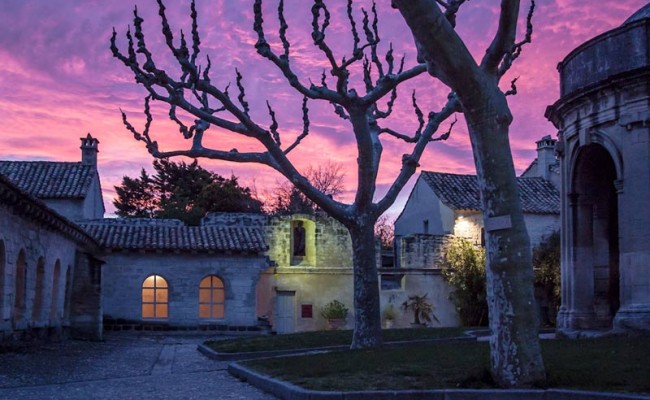In the cold weather
the cold city the cold
heart of something as pitiless as apathy
– Michael Dransfield, ‘Like This for Years’
At the moment my writing desk overlooks the clay-tiled roofs of a medieval monastery called La Chartreuse, in the Provençal village of Villeneuve-lez-Avignon. My view is buoyantly punctuated by the crimson blossom of a Judas tree and a stone wall foaming with jasmine. The exuberant spring of Provence is doing its best to lure me outside. I have to keep pinching myself.
Like the monks who lived here until the French Revolution threw them out, my presence is (ostensibly) not for pleasure. I am a guest at the Centre National des Écritures du Spectacle (the National Centre for Theatre Writers), where – thanks to the French Ministry of Culture and the CNES itself – I have a month’s residency.
The CNES is devoted solely to writers for performance; it is the only institution of its kind in the world. Founded at La Chartreuse in 1990, it has a constantly changing population of resident theatre artists. Writers come here to complete particular projects, and theatre companies to rehearse and show their works in progress. It has the largest library of theatre texts in France (6000 texts and manuscripts, as well as a well-stocked bookshop) and, of course, the monkish cells where artists stay and work.
Well, they call them cells. The Carthusian monks had quite large living quarters, the size of a generous one-bedroom apartment. Food was delivered daily via a hatch in the wall, and the monks spent their days and nights in solitude and silent contemplation.
The CNES doesn’t demand such austerity – for one thing, there is a nightly convivial communal meal where all the artists in residence meet and talk – but it’s undeniable that the environment invites undivided concentration. It’s the first time I’ve been to writer’s retreat of any kind, and I like it – quotidian cares are so far away that the small stresses that accumulate unnoticed every day are suddenly weightless.
Every writer knows that free time is a gift. This kind of idyll is precious beyond measure, never mind the glorious setting. But there is something else at work, too: I feel a liberating relief that I don’t have to apologise for my existence.
In Australia, artistic apologia is part of the texture of every artist’s life. It operates mostly at an unconscious level, which makes it difficult to trace. Everything here tells me that the work I aspire to make is valued, and it throws this feeling of apologia into stark relief. For the moment, it’s okay to be me.
It’s not that it’s easy being an artist anywhere. Materially speaking, it might even be easier to be an artist in Australia, where the standard of living remains high. And France hasn’t escaped the worldwide trend for savage cuts to arts budgets. I’m talking about something more subtle; an assumption, seldom spoken but manifest in countless mundane ways in daily life, that art is a crucial part of the intellectual life of a nation.
It isn’t as simple as claiming, as traditional cultural cringers are wont to do, that Australia is a culture of barbarians. The problem is not with the quality of work that is made here. Au contraire! Australia has the oldest living culture on the planet, and the contemporary work Australians produce is as worthy of notice as anything that emerges from other centres. It’s more in its mediation, in what art is assumed to be in the wider culture.
It operates as a pervasive nationwide assumption that art doesn’t matter, that it’s a luxury, an entertainment, an optional addition. The idea that art is a vital part of human response to the world, which has urgent complexities and truths of its own, is paid lip-service, but – in the media, in government, in so many of our institutions – it works on the level of pious cant rather than lived belief.
In part this expresses the great Australian tradition of anti-intellectualism, a stance that claims to be anti-elitist while preserving the treasures of culture only for the elite. Anti-intellectualism patronises the poor or disadvantaged or marginalised as being too stupid to enjoy art and thought, abandoning it to be the plaything of the rich. Consider, for example, how often the Liberal Party holds its shindigs at state art galleries.
The anti-intellectualism of some pundits reminds me of the Church’s objections to the vernacular Bible. When John Wycliffe translated the Bible into English in 1384, he was charged with arrogance and heresy, because permitting ordinary people to understand the Bible challenged the authority of the priests. The poor were to be confined to their allegorical paintings and stained windows; only the elite could be privy to the intellectual riches of God.
I have sometimes wondered if this suspicion of art has something to do with Australia being the only country in the world that was founded as a penal bureaucracy. I suspect it is linked to our brutal ignorance of Indigenous culture, a refusal which itself emerges from an anxiety about our occupation of this country that we are unable, as a nation, to acknowledge. It’s as if we have cauterised ourselves, in order to enable our comfortable cruelties. Art is, after all, a scalpel that removes scar tissue, inflaming feeling, excavating thought: a whisper of freedom that may threaten to unravel the catastrophic lies by which we live.



